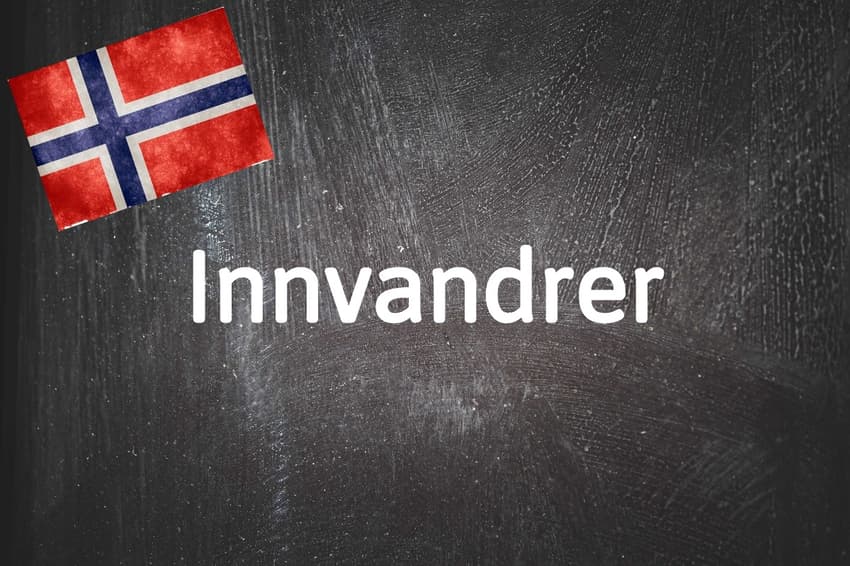Norwegian word of the day: Innvandrer

Today’s Norwegian word is all about wandering in
What does it mean?
Innvandrer most typically means a person who has immigrated from a foreign country, i.e. an immigrant. But the literal meaning is an ‘in-wanderer’, someone who wanders in.
This literal meaning, which more or less no one uses, comes from å vandre inn (to wander in). The wandering in, in this instance, can refer to anywhere- be that a home, shop or country.
Given the dual meaning, it’s somewhat surprising that a band of football-loving immigrants hasn’t banded together to form a team called Innvandrer Wanderers (Wandering-in Wanderers).
Back to immigration, and in public statistics and records, innvandrere (Immigrants) are classed as those born abroad to two foreign-born parents (and four foreign-born grandparents) who, at some point, have moved to Norway.
However, second-generation immigrants (andregenerasjonsinnvandrere), i.e. those who are born in Norway to two foreign-born parents, are also typically included in immigration statistics. This section of society is referred to as norskfødte med to innvandrerforeldre (Norwegian born with two immigrant parents).
Combined, immigrants and those born in Norway to two foreign-born parents account for just over 18 percent of the population in Norway as of 2022.
The reason why some second-generation immigrants are included in the statistics is that not all children born in Norway are granted citizenship at birth. Typically, they must wait until one of their parents obtains citizenship or until they are older to apply themselves.
Sometimes people may use utlending (foreigner) to refer to an immigrant. Although the definition of this word simply refers to somebody who isn’t a Norwegian citizen, whereas Innvandrer refers specifically to someone who has moved to Norway.
Examples:
Jeg kom til Norge som innvandrer i fjor.
I came to Norway as an immigrant last year.
Foreldrene mine er ikke norske, de kom hit som innvandrere på 90-tallet.
My parents are not Norwegian, they immigrated here in the 90s
Comments
See Also
What does it mean?
Innvandrer most typically means a person who has immigrated from a foreign country, i.e. an immigrant. But the literal meaning is an ‘in-wanderer’, someone who wanders in.
This literal meaning, which more or less no one uses, comes from å vandre inn (to wander in). The wandering in, in this instance, can refer to anywhere- be that a home, shop or country.
Given the dual meaning, it’s somewhat surprising that a band of football-loving immigrants hasn’t banded together to form a team called Innvandrer Wanderers (Wandering-in Wanderers).
Back to immigration, and in public statistics and records, innvandrere (Immigrants) are classed as those born abroad to two foreign-born parents (and four foreign-born grandparents) who, at some point, have moved to Norway.
However, second-generation immigrants (andregenerasjonsinnvandrere), i.e. those who are born in Norway to two foreign-born parents, are also typically included in immigration statistics. This section of society is referred to as norskfødte med to innvandrerforeldre (Norwegian born with two immigrant parents).
Combined, immigrants and those born in Norway to two foreign-born parents account for just over 18 percent of the population in Norway as of 2022.
The reason why some second-generation immigrants are included in the statistics is that not all children born in Norway are granted citizenship at birth. Typically, they must wait until one of their parents obtains citizenship or until they are older to apply themselves.
Sometimes people may use utlending (foreigner) to refer to an immigrant. Although the definition of this word simply refers to somebody who isn’t a Norwegian citizen, whereas Innvandrer refers specifically to someone who has moved to Norway.
Examples:
Jeg kom til Norge som innvandrer i fjor.
I came to Norway as an immigrant last year.
Foreldrene mine er ikke norske, de kom hit som innvandrere på 90-tallet.
My parents are not Norwegian, they immigrated here in the 90s
Join the conversation in our comments section below. Share your own views and experience and if you have a question or suggestion for our journalists then email us at [email protected].
Please keep comments civil, constructive and on topic – and make sure to read our terms of use before getting involved.
Please log in here to leave a comment.